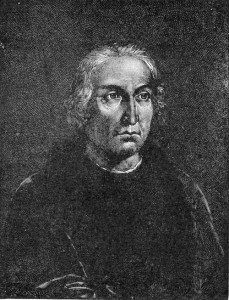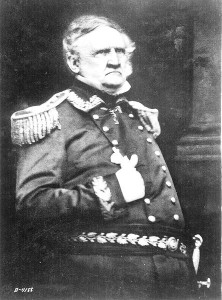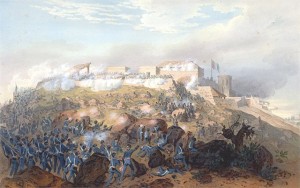Sometimes I have a tendency to act like I can make my own omens. At any rate, I thought it would have a nice symmetry if the first book I officially read after I started this site was Lee and Grant by Gene Smith: a book about two famous representatives of the Blue and the Gray or, in this case, the Gray and the Blue.
It seems like most of the reading I do nowadays is in bits and pieces during lunch break. So far I’ve enjoyed the book very much. I have read to the point in 1859 when Lee gets a message that he is supposed to report at once to the Secretary of War because of the trouble at Harper’s Ferry.
On this Columbus Day weekend I decided to share a little bit of what I’ve learned so far.Grant did not say much as a child and was considered a dullard while he was growing up. Children converted his name from Ulysses to “Useless”. Gene Smith describes Grant as less than ordinary as a child except for his ability to handle horses.
I never realized how accomplished Lee was in seemingly all areas of his life. His father, Light Horse Harry Lee, essentially abandoned his family. Therefore, beginning as a child of six Lee helped his invalid mother run the household. At West Point he had a career that has never been surpassed according to Smith. He was at the top of his class in every subject. He never had a demerit, and yet, he was also liked by his classmates. After he graduated he had a successful career as an army engineer. In fact, he is credited with having saved St. Louis as an inland port by building jetties and breakwaters to control the Mississippi
The War with Mexico
Although both Lee and Grant disagreed with the U.S. fighting the Mexican War, they both helped the Americans win. Lee and Grant both were part of General Winfield Scott’s command during the Mexico City campaign. Lieutenant Grant was a regimental quartermaster but took some tactical initiative during the battle of Chapultepec: he noticed a church belfry with a commanding view of part of the defenders’ position. He led a group of men who assembled a howitzer in the belfry and drove some Mexicans from a gate.
General Winfield Scott said without Lee the Americans would not have captured Mexico City. His actions during the campaign were truly courageous. I’m not going to mention all his heroic feats, but the “boy of great promise” was certainly living up to his potential during the Mexican War.
As far as I know, the only time Lee and Grant met before Appomattox was during the Mexico City campaign. Grant reported to Scott’s headquarters in a sloppy uniform. Colonel Lee was perfectly uniformed and mildly rebuked Grant by reminding the quartermaster that the general’s orders were that officers report to headquarters in full uniform.
The Fluidity of U.S. Grant’s Name, or who in the world was H.U.G.?
Grant was not born U.S. Grant. In fact, one of the most striking things I’ve read in the book so far is that for six weeks the baby Grant had no name. Then the extended family got together, put their choices on paper, and drew a name out of a hat. Grant was given a trunk to take to West Point. His correct initials were on the trunk – H.U.G. Grant did not want to be picked on by his fellow cadets for HUG, so he changed the initials to U.G.H. Obviously Grant had more name changes in store.
But I got to thinking:if Grant had stayed H.U.G., what would the newspapers have done after Fort Donelson? U.S. was Unconditional Surrender. What about H.U.?
The best I could do was Highly Uncompromising. What do you think?
Thanks to Karen’s Whimsey for the public domain photo of Christopher Columbus: Public Domain Images .



